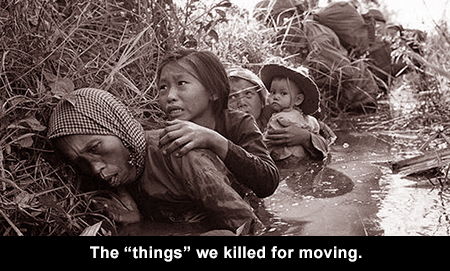I don’t read a lot of books these days, given my lack of personal time, but right now I’m reading a book I think every American should read. It’s called Kill Anything That Moves, by Nick Turse, it’s a few years old (maybe five or six), and it lays out the systematic slaughter of the U.S. war in Vietnam in sickening detail. Meticulously researched and documented, this book is a really useful guide to archival sources on what was certainly one of the greatest crimes of the 20th century and one that the United States has never come to terms with.

Here is a brief excerpt that describes what was done in the American effort to pacify the Binh Dinh region of South Vietnam in 1966:
During the six weeks of [Operation] Masher/White Wing, from late January to early March 1966, the 1st Cavalry Division fired 133,191 artillery rounds in to Binh Din’s heavily populated An Lao Valley and Bong Son Plain. The navy added 3,213 rounds from its ships. The air force launched 600 tactical air sorties, dropping more than 427 tons of general-purpose bombs, 265 tons of fragmentation ordinance, 165 tons of napalm, and 80 tons of white phosphorus, which damaged and destroyed more than 600 huts and other structures. Of course, troops on the ground also laid waste to many other homes at the same time.
Bear in mind that this took place in one small area of South Vietnam over the course of six weeks. Turse concentrates a great deal on the retail violence of the war, chronicling attacks on villages by Army and Marine units. Probably the most disturbing part of this narrative, aside from the wanton bloodshed, is the familiarity of the tactics. Our troops in Vietnam would profile Vietnamese in much the same way that drone pilots profile their targets – what decides your fate is where you happen to be standing, whom you’re hanging around with, what you look like, etc. It also recalls stateside police tactics.
Our media and our political leaders spend a fair amount of time criticizing other governments for not owning up to their crimes against humanity. For decades I have heard commentators decrying the strange resistance the Japanese have toward being honest about their imperial past, for instance. But what we have done with regard to our own imperial history is at least as impressive. This war that killed millions is barely known to us, except in broad strokes. This important book takes a major step towards remedying that little issue.
luv u,
jp
